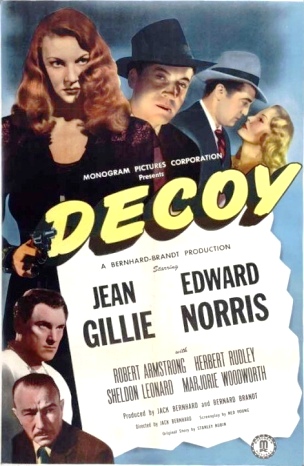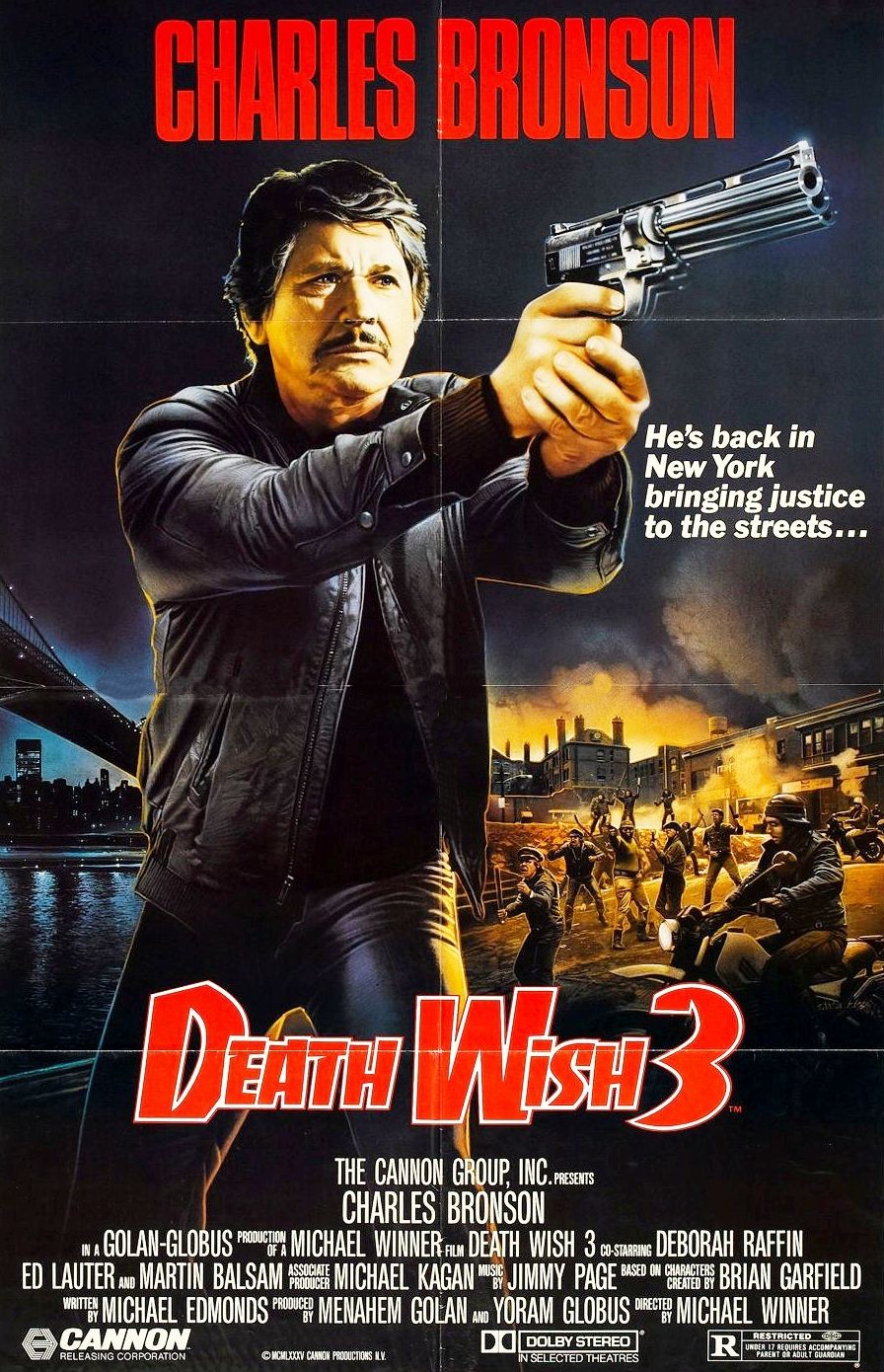Decoy (1946)
Director: Jack Bernhard
Production: Jack Bernhard & Bernard Brandt (Monogram Productions)
Screenplay: Nedrick Young - Story: Stanley Rubin
Starring: Jean Gillie - Edward Norris - Robert Armstrong - Herbert Rudley - Sheldon Leonard
Filmed in May 1946 - Released on 14-September-1946 - 76 min.
I say it without a doubt. Decoy is one of the most mysterious, unknown and surprising film-noir titles from the American cinema, one of those dark jewels that have improved along the years. And that knowing that both its director, Jack Bernhard, and ist main star, Jean Gillie, are two unknown names for most of the fans.
Production: Jack Bernhard & Bernard Brandt (Monogram Productions)
Screenplay: Nedrick Young - Story: Stanley Rubin
Starring: Jean Gillie - Edward Norris - Robert Armstrong - Herbert Rudley - Sheldon Leonard
Filmed in May 1946 - Released on 14-September-1946 - 76 min.
I say it without a doubt. Decoy is one of the most mysterious, unknown and surprising film-noir titles from the American cinema, one of those dark jewels that have improved along the years. And that knowing that both its director, Jack Bernhard, and ist main star, Jean Gillie, are two unknown names for most of the fans.
Little is known about Bernhard, that his father-Jeffrey Bernerd- was a Londoner who emigrated to the United States at the beginning of the XXth century to become one of the producers under contract with Monogram Pictures, and that this film is the first one of his short career as director -only 12 titles-; of Gillie, born Jean Mabel Coomber, that she had certain prestige in the English cinema when she met Bernhard, stationed as soldier in the British Isles during the 2nd World War. Both ended in the vicary and, after coming to Hollywood, Decoy had been raised as a launching film for both of their careers. However their relationship ended in divorce the following year, and Gillie only participate in another movie -Zoltan Korda's The Macomber Affair (1947)- before dying victim of a pneumonia at the age of 33.
Several elements conspired together to turn it into the cult movie that is nowadays, among them the appointment of Steve Broidy as president of Monogram and his desire to raise the studio above the "programmers" cinema that it had produced till then, an idea that the young Walter Mirisch -hired as his assistant at the beginning of 1946- ended up by carrying out with the creation of Allied Artists Productions, a production unit designed for the creation of bigger budget movies that, subsequently, finished assimilating the mother studio. Even more important it was having a script as shameless as the one manufactured by the beginner Nedrick Young -future Oscar winner for Stanley Kramer's The Defiant Ones (1958), written under a pseudonym due to being blacklisted by the HUAC- on an original idea by Stanley Rubin -later producer of, among others, Otto Preminger's River of No Return (1954)-, a text that Bernhard excellently knew how to set in motion with an adjusted group of actors and a main protagonist absolutely perfect for a role so unhinged as that of Margot, the sublimation of the femme fatale capable of seducing -and to kill, if possible- all the male characters of the movie, someone moved by a mixture of sadistic instinct and money lust not far from the Trina of Greed (1924), Erich von Stroheim's cropped film monument. All of this ended up by creating an imperfect but wonderful movie, one of those that remain in the memory. Very, very recommendable.
Lo digo sin tapujos. Decoy es uno de los títulos más misteriosos, desconocidos y sorprendentes del cine negro norteamericano, una de esas oscuras joyas que han mejorado con el paso del tiempo. Y eso que tanto su director, Jack Bernhard, como su estrella principal, Jean Gillie, son dos nombres ignotos para la mayoría de los aficionados.
De Bernhard poco se sabe, salvo que su padre -Jeffrey Bernerd- era un londinense que emigró a Estados Unidos a comienzos del siglo XX para convertirse en uno de los productores a sueldo de Monogram Pictures, y que éste filme fue el primero de su corta carrera como director -tan sólo 12 títulos-; de Gillie, nacida Jean Mabel Coomber, que tenía cierto predicamento en el cine inglés cuando conoció a Bernhard, estacionado como soldado en las islas británicas durante la 2ª Guerra Mundial. Ambos habían terminado en la vicaría y, tras afincarse en Hollywood, Decoy había sido planteada como titulo de lanzamiento de la carrera de ambos. Sin embargo su relación había terminado en divorcio al siguiente año, y Gillie sólo pudo participar en otra película -The Macomber Affair (Pasión en la selva, 1947) de Zoltan Korda- antes de fallecer a los 33 años víctima de una neumonía.
Varios fueron los elementos que se conjuraron para convertirlo en el filme de culto que es hoy en día, entre ellos el nombramiento de Steve Broidy como presidente de Monogram y su deseo de elevar el estudio por encima del cine "de relleno" que había producido hasta entonces, una idea que el joven Walter Mirisch -contratado como su asistente a comienzos de 1946- terminó llevando a cabo con la creación de Allied Artists Productions, una unidad de producción diseñada para la creación de películas de mayor presupuesto que, ulteriormente, acabo por asimilar al estudio madre. Aún más importante fue el disponer de un guión tan descarado como el manufacturado por el novato Nedrick Young -futuro ganador de un Oscar por The Defiant Ones (Fugitivos, 1958) de Stanley Kramer, escrito con pseudónimo al estar en la lista negra del HUAC- sobre un idea original de Stanley Rubin -más tarde productor, entre otras, de River of No Return (Río sin retorno, 1954) de Otto Preminger-, un texto que Bernhard supo ambientar excelentemente con un grupo de actores ajustado y una protagonista principal absolutamente adecuada para un rol tan desquiciado como el de Margot, la sublimación de la femme fatale capaz de seducir -y matar, si se tercia- a todos los personajes masculinos de la película, alguien movido por una mezcla de instinto sádico y lujuria por el dinero no muy alejada de la que mostraba la Trina de Greed (Avaricia, 1924), el recortado monumento cinematográfico de Erich von Stroheim. Todo ello terminó construyendo un filme imperfecto pero maravilloso, uno de esos que se quedan en la memoria. Muy, pero que muy recomendable.



Comentarios
Publicar un comentario